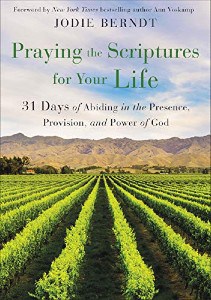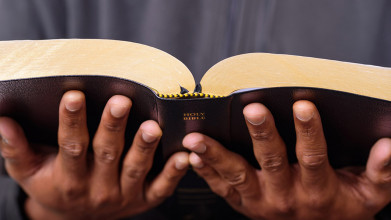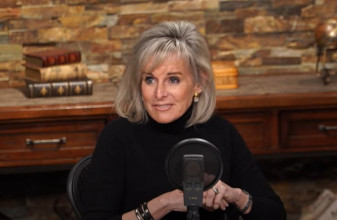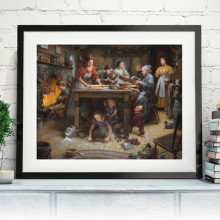
The War of Words
In this Adventures in Odyssey drama, a carelessly uttered word from Eugene creates havoc as it becomes the fashionable insult, resulting in a lesson about the power of words.
Home » Episodes » Focus on the Family Broadcast » Why Praying for Yourself is Essential
Preview:
Man #1: A common prayer that I pray for myself is “Lord, help.”
Woman #1: When I pray, I pray that God would give me and my husband a family one day.
Man #2: I pray that I’ll be a good husband for my wife.
Woman #2: I often pray that God would make me more aware of him in my day-to-day life.
Woman #3: I’m eight months pregnant, so my prayers these days are mostly Lord, please help me be a good mom and not mess up this baby! (laughter)
End of Preview
John Fuller: Well, those prayers, do they sound familiar? What kind of prayers do you pray for yourself? Today on Focus on the Family, we’re gonna be learning more about the power and the purpose of prayer. Thanks for joining us, I’m John Fuller and your host is focused president and author Jim Daly.
Jim Daly: John, this is one of those obvious topics where we know the right thing to do, but it’s hard to do it. And it’s about prayer and particularly prayer about ourselves. I think we’re even quicker to want to pray for others. It’s easy to pray for someone who’s struggling.
John: Mm-hmm.
Jim: But when we’re the ones struggling, I think we do kind of find it more difficult to say, “Lord, I need help.” And it’s such a genuine, uh, opportunity to say, “Lord help me.” And you can get so distracted from that type of prayer because there’s so many other people that need care and attention, especially in a busy mom’s life. Think of that. And today we’re going to talk about how important it is for you to pray, um, for the Lord to engage with you directly.
John: Yeah. And this is one of those, uh, topics, Jim, that I think a lot of us feel under equipped. We feel like we’re in effective, um, prayer might seem rote or routine, or maybe God doesn’t seem to be answering my prayers. There’s just a whole lot of weaknesses associated with prayer.
Jim: There is, and I just wanna get to it because (laughs) you, you’re gonna feel and know the heart of our guests today. Jodie Berndt, who is back in the studio with us. She has studied the topic of prayer for many years. She’s written how to pray for your children, how to pray for your teens, how to pray for your adult children and, uh, this new book is about how to pray for you, how to pray for yourself. And I’m looking forward to it today. Uh, Jodie, welcome back.
Jodie Berndt: Thank you. Thanks so much for having me.
John: And let me just mention, Jodie is an author and speaker and a Bible teacher and has written 10 books. Uh, Jim referenced (laughs) some of those.
Jim: I tried.
John: She has a brand new one called Praying the Scriptures for Your Life: 31 Days of Abiding in the Presence, Provision, and Power of God. And we have copies of that at focusonthefamily.com/broadcast or call 800-A-FAMILY.
Jim: Jodie, there was a time when, and I so relate to this. Uh, you viewed praying kind of like a vending machine. Lord, this is what I need. Pop, there it is. And you reach in and pull it out (laughs). I think a lot of people can relate to that, but that’s not what God wants-
Jodie: Yeah.
Jim: …In our prayer relationship, right?
Jodie: Yeah. I definitely, for a, for a lot of years, you know, you don’t really know how to pray if you’re doing it right. And I thought, okay, I’m gonna ask God for something. And then if it happens, must’ve been a good prayer. And if not, you know, maybe I did it wrong or I didn’t, whatever. And it felt very transactional.
Jim: Right.
Jodie: And yet, as you look at Christ model for prayer, right, it’s all about connection. And this new book really came out of about two years of me just spending time in John 15. And it’s the, the hours right before his crucifixion. And he’s hanging out with the disciples, you know, his closest companions. And you think, golly, what does he want to say? You know, what would we say to our closest friends if we knew our time was short? And you think all the stuff he could have talked about, you know, he could have talked about evangelism. He could’ve talked about how to preach a really great three-point sermon.
Jodie: He could have talked about feeding 5,000 people again, you know, let’s go over that one again, ’cause that seems very useful, but he doesn’t. He really drills down in those last words on prayer. And he says, and I think this is one of the most remarkable promises in all of scripture. He says, “If you remain in me or if you abide in me and my words remain in you, ask whatever you wish, and it will be done for you.” And so, he’s telling them, let’s not just have it transactional. Let’s have it be a connection point, a remaining, you know, I’m gonna remain in you as my holy spirit takes up residence in your life. Let my words remain in you. We have his scripture. Um, and we can ask him for whatever we wish.
Jim: Yeah. Such a great promise.
Jodie: A promise but remarkable.
Jim: Yeah.
Jodie: It sounds like a, you know, late night infomercial, like too good to be true, but you realize why he’s doing it. And the very next verse in verse eight, he says, “This is to my father’s glory, that you bear much fruit showing yourselves to be my disciples.” And that’s why he wants us to ask him for stuff, because he wants us to bear fruit. He wants us to be people of impact. And that’s where Jesus says, “Let my words remain in you.” Because the more we dig into scripture, the more we spend time getting to know God through his word, the more the things that we want, the more our desires begin to line up with what he already wants to do.
Jim: Yeah, it’s so true.
Jodie: Yeah.
Jim: It’s good. Uh, speak to, uh, all of us, Christians, particularly obviously, how we tend to be a little passive with prayer, or even in my opinion, even worse, we make it like the thing of last resort.
Jodie: Right, right.
Jim: We don’t speak to God for years. And then when our back is up against the wall, oh, we better pray now. I mean, I guess it’s good that you are praying-
Jodie: Sure, sure.
Jim: …In that moment, but why not make that a regular routine, right, talking to God (laughs).
Jodie: Why not? Make it more a, a regular thing. You’re so right. I mean, we were talking earlier about human relationships and how many marriages would thrive if the only time you talked to your spouse with when you really needed something or how many, uh, children will feel loved, or parents would feel loved if the only thing was okay, I made dinner, here it is, the child never said I’m hungry or thank you. You know, it’s this asking, this receiving, this thanking that helps strengthen our connection.
Jim: Yeah.
Jodie: And I think that’s what God wants ’cause he could give us anything we need. And he does, a lot of times when we don’t ask. But when we ask and acknowledge him as the source of our provision, that’s signals relationship.
Jim: Yeah.
Jodie: And that’s what he wants, that’s what he wants. Relationship with us.
Jim: I wanna go back at the abiding-
Jodie: Yeah, yeah.
Jim: …Part that you mentioned that of John 15, ’cause abiding could, you know, even some people may not even really understand the definition-
Jodie: Absolutely.
Jim: …Of the word. So, let’s spend a few moments on abiding in Christ.
Jodie: Yeah. You know, and I wouldn’t, if you’re listening and you say, I don’t know what that is. You’re among friends because I’ll tell you what? I went to a Christian camp growing up where we learned to (laughs) sing this song. And I, I, I’m not a good singer, but I will just say it went abiding in the vine, abiding in the vine. And I didn’t know what it was talking about. And my much younger brother was about four and he would sing it, but he would sing, we’re fighting in the barn, we’re fighting in the barn (laughs). He didn’t understand the lyrics. And I thought, you know, I can-
Jim: He loved the beat. (laughs).
Jodie: …Well, I thought to myself, I can picture what a barn fight looks like (laughs). You know, we can all picture of, of a fight in a barn, but I had no idea what it looked like to abide in the vine, you know. So that is a little confusing and old-fashioned sounding. And yet, you know, we were talking earlier too about different Bible translations. And as you read that, John 15 verse, he says remain in me 11 times in 10 verses in John 15. So obviously it matters to him. And as you compare the translations there versus like abide in me, remain in me, dwell in me, let my words dwell in you, let them take up residence in you. And I think that’s really what it comes down to is sort of that connection, that place of surrender, that yielded ness to him and to his words.
Jim: What are the benefits of abiding in Christ?
Jodie: Hmm, what are the benefits, you know, such a good one. Um, Andrew Murray wrote a book called Abide. Um, and it’s, it’s from this John 15. And it’s so interesting because, and again, I’m so frightened that I’ll get it wrong, but I wanna get across his gist, he says, “As believers, we completely get the idea that apart from Christ, we can do nothing.” You know, Jesus says, “Um, remain in me because apart from me, you can go, do nothing.” Right, John 15 verse five. And when we are like, we get that, you know, we think we need to stay attached to get his strength and his source through our lives. But what we miss is that just as the vine is dependent on the branches to bear fruit, ’cause you don’t see the grapes just popping out of the trunk or the vine, right. It needs the branches for the sap to go through. So, God, for reasons we might not ever understand has chosen to make himself dependent on us as the branches to dispense his fruit, his blessing, his provision in the world. So, you talked about the benefits to abiding, certainly we get filled up with that connection, that love, that relationship with Christ. But we also get to become people who can make a difference in our world because we are the branches that bear the fruit.
Jim: Yeah.
Jodie: We’re the ones that dispense his blessing and provision in the lives of the people around us.
Jim: I think too. And that, that is a good insight. I love the analogies that God has given us in his-
Jodie: Oh, he is so good. Yeah.
Jim: …Natural world like that.
Jodie: Yeah.
Jim: Just looking at the grape vines, et cetera.
Jodie: Mm-hmm.
Jim: But also, that abiding principle is really knowing the peace of God.
Jodie: Mm-hmm.
Jim: When there’s chaos and turbulence in your life.
Jodie: Right.
Jim: When you can really abide in him, there is a sense of peace. You know, I know many people whose spouse has passed away.
Jodie: Mm-hmm.
Jim: And when I call them on the phone to talk with them or spend time with them, they talk about that peace that they feel even in the midst of that great pain, that’s what we’re talking about. That ability to abide in God, to abide in Christ even when there’s turmoil all around you.
Jodie: Right. It’s an anchor place, isn’t it?
Jim: Yeah.
Jodie: It’s an anchor place for our faith, for our trust, to know that we are held.
Jim: Yeah.
Jodie: And we have something to hold on to.
Jim: Jodie, you’ve outlined 31 different ways to pray and abide in Jesus. And this is what your book’s all about. Praying the Scriptures for Your Life. Uh, let’s explore-
Jodie: Yeah.
Jim: …A few of those starting with marriage (laughs).
Jodie: Yeah.
Jim: There’s a place where many people say, “Yeah, if you can give me peace in my marriage, I will call you blessed.”
Jodie: Oh, yeah.
Jim: Um, what is that first one on marriage? And uh, how do we say often like we do, God, please change my spouse.
Jodie: Oh, don’t do that.
Jim: I mean, I’m going there ’cause it’s true.
Jodie: Oh, God.
Jim: We do say that. I’d have a perfect marriage if it wasn’t for my spouse (laughs).
Jodie: Well, and you’re hitting close to home on this one because I share the story in this book. ‘Cause we do, we pray, God you know, fix him, change him, fix her, change her. But I’ll tell you, early on in Robbie’s and my newlywed years, we all come to marriage with different backgrounds and different baggage, you know, label it, whatever you will. But we’re not raised in the same home. So, things are done differently. And in our case, I had come from a home where, uh, my dad did a lot of the grocery shopping. He did a lot at the kitchen cleanup, you know, all of that. And I just sorta expected that Robbie would be that. Robbie had grown up in a home where his mom really, if something happened inside the house, she was taking care of it.
Jim: She was the CEO of the house. Yeah.
Jodie: But yeah. She was the cooking, the cleaning. And you know, his dad would hang out with her. He might read the paper or fix himself something to drink. And, and he was being supportive. It wasn’t like he was this absentee dad, but, but so Robbie came into the marriage with that model, and I came into the marriage thinking, okay, where’s the food? Did you get the groceries? You know. (laughs).
Jim: I can imagine the first night.
Jodie: And yeah.
Jim: The dishes are laying around.
Jodie: The first night, imagine the first year, you know, (laughs) I mean, it was, it took a little while with both of us kind of looking at the other person, wondering who is this person I’ve married and how has this guy? And I’ll, I was spending time praying saying, “You know, God just teach him to do this. Just fix him, just make him more like my dad.” Was really what I was praying.
Jim: Mm-hmm.
Jodie: A lot of girls I think get married and think, God, he’s not like my dad. Well, God very gently said to me, “You know, Jodie, if you would just stop nagging (laughs) and if you would trust me, I can shape Robbie into a better husband than you could ever make even if I gave you a blank check to design the man, you know, that you th- would think to be perfect.” And so, I did, I said, “All right, Lord, I’m just gonna stop my nagging. And I’m even gonna stop my praying and I’m gonna start my trusting.” And I kid you not the day after, and I know God doesn’t always work in an instant, but in this case, he was really bringing the point home. I was in the kitchen the day after deciding I’m not gonna nag and I’m just gonna release. And I, it was a tiny little newlywed kitchen, you know, a smaller than this table and I’m in there and I’m chopping up the broccoli and he’s in the other room when he peaks his head around the corner. And he says, “Is there anything I can do to help get ready for dinner?” And you ho- I, I burst into tears and I’m sure he’s thinking (laughs) like picture any, you know, young husband thinking, what? I thought I was trying to help (laughs), now she’s crying again. You know, these poor guys there, we keep them guessing. But it was like, God had said, see, just trust me. And I will tell you that over the years, he has been faithful, that he has shaped Robbie into a husband that exceeds anything in my wildest dreams. But it’s not because of my nagging. It’s not because of my suggesting (laughs). It’s not because any of that, it’s because of God’s work in both of our lives.
Jim: You know, Jodie, I so appreciate that vulnerability and transparency.
Jodie: Mm-hmm.
Jim: I mean, speak to that woman right now, who is still there saying-
Jodie: Yeah.
Jim: …Change him.
Jodie: Yeah, change him.
Jim: And then really, um, you know, that bitterness that can crop up.
Jodie: Oh, yeah.
Jim: I mean, you’re, you’re a joyful person. I think it’s, if I could say it this way, you seem to be a person that would naturally see improvement and go, wow, thank you, Lord. Some spouses that bitterness gets so deep.
Jodie: Yeah, yeah.
Jim: The, I guess I would say the mud over their heart-
Jodie: Right.
Jim: …Is so deep that when the Lord moves, they may not even recognize.
Jodie: You might even… And, and, and that’s real.
Jim: Yeah.
Jodie: Um, and I have been there. You might think I’m joyful, but I definitely can get in my gloom funks and, and, and be there as well. Um, and I think that’s an intentional surrender and an intentional yielding and an intentional Lord work in me. And you know, I’ve always said one of my favorite prayers when we don’t feel loving, when we don’t feel forgiving, sometimes I’m like, I can’t even go there and God will say, “How about the prayer of make me willing to be willing?”
Jim: Right.
Jodie: You know, not just make me willing to forgive or make me willing to love but make me willing to be willing to love. And I think sometimes too, if we resolve to take a perspective shift, like another thing, um, poor Robbie, I hope he doesn’t listen to this broadcast (laughs).
Jim: He’s in the gallery.
Jodie: But oh God.
Jim: He’s listening right now (laughs).
Jodie: Like, okay so early on, early on in our marriage, um, he would just, and I know probably every wife who’s listening will hear this. He would like have his t-shirts and just drop his laundry on the floor of the bedroom or wherever.
Jim: Way to go Robbie.
Jodie: And I would think (laughs), I would think, okay, the hamper is like three feet away.
John: How hard can this be?
Jodie: Yes, yes, and…
Jim: Is this every marriage or what?
Jodie: Yes. I want the-
John: Yeah.
Jodie: …Women right now to call Focus on the Family to say amen (laughs).
John: By the way for us is the dishwasher (laughs).
Jodie: Okay, the dishwasher. Okay. There you go. And I remember seeing that and I said to Robbie, “What w- you know, what is it, uh, that makes {inaudible}? And he was funny. He said, “Oh gosh, you know, I’m, I’m away on a business trip or I’m going off to work. And I thought that would remind you of me when I’m gone, if you saw…” (laughs).
Jim: Oh, how sweet, that’s so sweet.
Jodie: And, and, you know, I will tell you, in, in, in the honest planet (laughs), true confessions, what rose up in me right then was not gratitude (laughs) or a reminder, it was a, what the heck.
Jim: Without a doubt.
Jodie: But, but in an instant, I saw the humor in it, and I thought, you know what? I am gonna look at his t-shirt and say, “Let that be a trigger for me for gratitude.” So, wife, when you see-
Jim: Mm-hmm.
Jodie: …That thing that bugs you, let it be a trigger to say, “I have a husband, thank you God.” Or in my case, I was like, “I have a washing machine. You know, that’s a gift from God.” It’s a, it’s-
Jim: Yeah.
Jodie: …Something we might overlook. But, but to see that and think I can wash this thing and I have a husband, even the things that annoy us, if we give them to God and say, “Help me see them as blessings.” He can flip that whole equation around-
Jim: Yeah.
Jodie: …And you can see that.
Jim: And I think that’s the reason I asked.
Jodie: Yeah.
Jim: Because you’ve got to come to a point where you can actually let go of that bitterness.
Jodie: Yeah, yeah.
Jim: Especially in your marriage.
Jodie: Yeah.
Jim: And leave it to the Lord-
Jodie: Leave it to the Lord.
Jim: …To work on your spouse. Yeah, yeah.
Jodie: And we talk, there’s a chapter in the book on forgiveness and in there too. Um, you know, and I’ve heard, you know, you’ve heard this quote, ’cause everybody says it in some shape or form, but hanging on to bitterness is like, uh, drinking poison and hoping the other person will die.
Jim: Yeah, totally. Yeah.
Jodie: You know, all of that, it’s, it’s, it’s us, that…
Jim: It is a good one to remember.
Jodie: Yeah, it is.
John: Uh, in the book Jodie refers to is Praying the Scriptures for Your Life: 31 Days of Abiding in the Presence, Provision, and Power of God. The author is Jodie Berndt. She’s our guest today on Focus on the Family, give us a call to get your copy of this. This is one of those books that you will go to time and time again, our number is 800-A-FAMILY or stop by focusonthefamily.com/broadcast.
Jim: We’ve covered the, uh, the marriage side of this (laughs). Now, guess what’s next? Praying for your children.
Jodie: For your children, here we are
Jim: And the and worrying about them.
Jodie: Oh gosh.
Jim: I think that’s probably the big thing.
Jodie: Yeah.
Jim: You’ve kept a, a log, a prayer log, which I think is great. I wish I would have done that. Um, I tended to remember that in my mind, but how did you keep the log? And when the Lord answered prayers, how did you share that with your kids?
Jodie: Well, one of the things I do that I think anybody can do, whether you’re a journaler or not, but as you know, I’m all about praying the scripture. I’m about taking scripture and reading it and saying, “Oh, uh, be kind and compassionate to one another.” You read that in Ephesians and you wanna flip it around and say, “Lord, make my kids kind and compassionate to one another.” You know, it, it takes the Bible as a, as a conversation starter where God is speaking to us and we’re praying it right back to him.
Jim: Mm-hmm.
Jodie: And there’s real power there. Um, so what I, my Bible is full. If you, if you pulled it out, you would see that there are notes in the margins and it’s kind of fallen apart because it’s old, but I might’ve prayed this one over my son in 2006 or this one in 2009 or 2011. And then years later when I go by and see how God has answered that, that’s a fun remembrance. It’s a, it’s a little altar right there in the, in, in a good way.
Jim: Yeah.
Jodie: You know, by the altar and say thus far, the Lord has helped me to say that this is where I saw God move. And I also keep, um, keep a prayer journal.
Jim: Yeah.
Jodie: And I like to go back to that and, and see what God has answered, how he’s answered in ways I didn’t expect, which is often, you know, he doesn’t always answer in the way we expect. But yeah, I’m a big fan of recording that.
Jim: Yeah. Jean and I, the other day, we’ve gotten into a good habit of reading together and praying together early in the morning. And the other morning, Troy, our now 18-year-old, he was down getting breakfast before heading off to school. And, uh, I was trying to decide, do I just go ahead and pray like I would normally pray for him in front of him. I mean, he’s about 30 feet away.
Jodie: Mm-hmm.
Jim: But he could hear.
Jodie: Yeah.
Jim: And uh, I said, no, I’m just gonna pray the way I normally pray.
Jodie: Yeah.
Jim: So, I prayed for his future spouse. I prayed for soul and his well-being and his wisdom toward the Lord and pursuing-
Jodie: Yeah.
Jim: …God’s heart for his life. You know (laughs), I’m thinking, okay, what is he thinking right now? But you know, I want him to hear how I pray for him.
Jodie: I bet you, he thought that, and he heard it and I bet you, he loved it. And I will tell you on the other side of parenting, you know, with our kids being grown now, the thing is they might’ve rolled their eyes at, especially during the teen years-
Jim: Right (laughs).
Jodie: …Are the things they’re grateful for now.
Jim: Yeah, it’s so true.
Jodie: And there is nothing I think that can build a kid’s confidence as much as seeing their earthly parent talk to their heavenly parent about them.
Jim: Yeah. It’s a good thing to model and and be sincere with it. Don’t, don’t hype it up-
John: Yeah.
Jim: …And pretend, I mean, do what you would normally do-
Jodie: Right, yeah.
Jim: …I think for your son or daughter, to see that as a good, uh, insight.
Jodie: I agree, I agree.
Jim: Uh, let’s move to how the Bible describes loving others (laughs) or…
Jodie: Right. Let me, let me just step back one minute though, because you said, um, it’s something that’s good for them to see. And it is that, that praying over their day, praying over their spouse, praying… But but when our kids are in a tricky spot and we are crying out to God, po- Lamentations, you know, 2 says, “Pour out your heart, like water in the presence of the Lord.” And a lot of that is an absolute gutting ourselves. I might, I’m not sure I would let my kids always see that.
Jim: It’s wisdom, right.
Jodie: Just, just…
Jim: When there’s conflict, you’re right.
Jodie: Yeah, when there’s conflict, you’re talking-
Jim: I would agree.
Jodie: …To the heavenly father, but they might not need to know how distraught you.
Jim: I would totally agree in that context. Let’s move to another, uh, important area where we need to be praying for ourselves. And again, it’s not selfish to pray for yourself. It’s good to pray for yourself.
Jodie: No, but I w- but I… Please say that again.
Jim: Yeah (laughs).
Jodie: It is not selfish ’cause I spent so long thinking it’s great to pray for my kids. It’s great to pray for the starving people in Africa. It’s great to pray for world peace, but you just feel like so wrong when you come to God with your own needs and yet (laughs) God is going, no, please come to me.
Jim: And I think that is a, a mom/wife thing.
Jodie: Maybe some.
Jim: I, I really do, because I think women are so quick to not want to do something for themselves.
Jodie: Yeah, yeah.
Jim: It’s just built in. It’s a beautiful thing. It’s a very humble thing, but it’s okay to pray-
Jodie: Yeah.
Jim: …For yourself.
Jodie: Yeah, absolutely.
Jim: In that regard, why forgiveness is such a challenging thing for us to do.
Jodie: Yeah.
Jim: Um, and of course, for forgiveness to be rooted properly, we need to start in prayer.
Jodie: Yeah.
Jim: Help me Lord, to forgive that person-
Jodie: Yeah.
Jim: …Who has wounded me.
Jodie: Yeah, yeah. And life is full of wounds. Isn’t it? And offenses. And if someone hadn’t said, they’re sorry, you know, we think, well, I can’t forgive them. And yet Jesus would say, “Oh yes, you can.” Just like he has with us. Um, we don’t have to wait. And the longer we hold on to that unforgiveness and let that bitterness take root, it’s like we said earlier, it’s like drinking poison and hoping the other person dies. We give the offender power, you know, Lewis Smedes has written extensively on the-
Jim: Mm-hmm.
Jodie: …Power of forgiveness. And I love what he said. He’s like, “We let this monster build up and they have this control over us because they have heard us. But when we forgive them, we take their power away.”
Jim: Right.
Jodie: It’s just amazing. It’s amazing. And I tell the story in the book I love it. Uh, ano- another UVA story, uh, the center on our team, Jay Huff was part of the national championship team in 2019.
Jim: You’re bragging a little bit (laughs).
Jodie: Yeah. Can I please talk a little bit more about that? And can I say the national championship? (laughs) Okay, say that slowly. Um, no, but Jay, as a high school, I got to know his dad and his dad said that, um, as a high schooler, Jay had a really high radar for what was right and what was wrong, what was fair and what wasn’t. And so, when he saw the refs make a bad call, he would protest, you know, everything. And I’m like, that’s a bad call. And as a result, he would get technical fouls. And that was not a good thing for-
Jim: Right (laughs).
Jodie: …Budding athlete, you know, he had to learn to keep that under control. And his dad finally sat him down and he said, “You know, Jay, nobody got a worse set of calls than Jesus.” Right. He didn’t do anything wrong. And look at the call he got, and he said, “So what did Jesus do?” You know, he took it. He responded in forgiveness. He responded in love. And what a great lesson for us when we think we have been so wronged, and maybe we have, to look at Christ and say, “Lord, help me respond.” As he did in love and in forgiveness, even if the offender hadn’t said, they’re sorry.
Jim: That is an amazing thing to remember.
Jodie: It is.
Jim: I mean, we have to remember that. I would put that too in the context of culture and where we’re at as Christians.
Jodie: Mm-hmm.
Jim: And you know, the cancel culture-
Jodie: Yeah.
Jim: …That we talked about before.
Jodie: Yeah. We think we’re so right to hang onto our, our offended-ness in our…
Jim: Well, right. And how do we exemplify the attitude of Christ when people are throwing stones at us?
Jodie: Mm-hmm.
Jim: You know, Stephen kind of gave us that model.
Jodie: Yeah.
Jim: It’s not one that we want.
Jodie: Yeah. Yeah. And well, the cancel culture is nothing new. You know, as I’m reading my Bible this year and I’m finding that, you know, Jews are afraid because they know that, that, that if they acknowledge that Jesus healed this person or that person, that they’re gonna get put out of the synagogue, you know, they were getting canceled early on as well.
Jim: Right.
Jodie: Those are real…
Jim: As part and parcel of being a Christian.
Jodie: It was a real threat, yeah.
Jim: It’s the history.
Jodie: You know, somebody is gonna cut you off, cancel you, not let you come into their group, whatever it is, we all get canceled. And yet how we have to respond again is in that love and in that forgiveness and that faithfulness.
Jim: So true.
Jodie: Not compromising our values.
Jim: Right.
Jodie: I’m not saying, you know, be rolled over.
Jim: Right.
Jodie: But I’m just saying, don’t respond with, up in the ante of anger.
Jim: Well, and this kind of dovetails into the final question I wanted to ask you about, I was fascinated by how you compare the word patience to suffering.
Jodie: Yeah.
Jim: Um, it’s kind of what you’re talking about, whether it’s in the cultural-
Jodie: Yeah.
Jim: …Context or in the marital context.
Jodie: Yeah.
Jim: Or in the child-rearing context.
Jodie: Right, right.
Jim: And I’m, I’m thinking of that person that, you know, is praying for that patience, but they don’t wanna suffer.
Jodie: Yeah.
Jim: We don’t wanna stay in the suffering mode.
Jodie: You know, patience, uh, Galatians tells us patience is a fruit of the spirit, right? And so, it’s a good thing, but I will say in my own experience, I did not equate patience with a good thing. It, it, it seemed like it was a code word for an unmet longing, you know. Or, uh, or an unmet desire or need even to the point of suffering. And I was intrigued to learn that, um, patience actually does come from the Latin word for suffering. There’s a link there. Um, don’t press me on that because I’m not a word smith, but I, I did read that one. Um, and when we wait, we do need to have that, that courage, that strength. God says in Psalm 27:14, “Be strong and take heart and wait for the Lord.” Because God could have any number of reasons why he might be calling us to wait. He might be asking us or wanting us to refine our desire and our longings so that we are actually desiring what it is that he wants us to give. He may be, um, allowing us to build our faith. How much more grateful are you and how much more are you apt to acknowledge God’s provision when you do finally get that car? When it’s the farmer praying for rain, when it’s the couple trying to conceive, and they haven’t yet been able to do that-
Jim: Right.
Jodie: …When that baby comes, there is an acknowledgement of God’s goodness and a gratitude that wouldn’t have been there had we not had that season of waiting?
John: Well, that’s how we concluded a wonderful conversation with Jodie Berndt about her book, Praying the Scriptures for Your Life. And it might be that you’re identifying with what she’s saying. You’re in a spot where you’re facing challenges and you feel like God is distant. Uh, if that’s, so we wanna connect you with one of our caring Christian counselors. Um, we’d be happy to set up a time for an initial phone consultation where they can, uh, listen to your story. They can pray with you and then direct you to additional resources and maybe even a counselor in your own area.
Jim: And, you know, John, we touched on some very tender spots, right at the end there, uh, where, um, people have incredible, uh, emotional, spiritual, or physical needs. And we want to make sure that, you know, we’re here. So, I’m glad you mentioned the counseling department. Also get a copy of Jodie’s encouraging book. This will really help you grow in your faith. And I highly recommend it, uh, maybe for you, but also think about a friend who might need it, uh, perhaps for your church library. Uh, we can send this book to you when you send a gift of any amount to Focus on the Family. That’s our way of saying thank you for partnering with us to strengthen families today. And right now, it’s critical that we hear from you as we move into the Christmas and end of your season. A lot of people are considering that end of year gift. And we pray, you’ll remember Focus in your decision-making because we have a great opportunity for you right now. Some generous friends are willing to match any donation you make to the ministry dollar for dollar. And that means your $50 gift is a $100 gift. And that will go toward rescuing hurting marriages, equipping parents, and giving families hope. So, please be generous with your support of Focus on the Family today.
John: Contribute when you call 800, the letter A, and the word FAMILY, or donate, get the book and, uh, connect one of our counselors if you need to. All of that, uh, at focusonthefamily.com/broadcast. And coming up next time, we’ll be addressing a really serious problem in far too many marriages today.
Preview:
Rosie Makinney: And so, I said to him, “I, I love you and I love us too much, but you need help because you can have pornography or you can have me, but you cannot have both.”
End of Preview
John: On behalf of Jim Daly and the entire team, thanks for joining us today for Focus on the Family. I’m John Fuller, inviting you back as we once more help you and your family thrive in Christ.

Jodie Berndt is a public speaker, a Bible teacher, and the the author of 10 books, including the best-selling Praying the Scriptures series which helps parents pray more effectively for their children. The series includes Praying the Scriptures for Your Children, Praying the Scriptures for Your Teens and Praying the Scriptures for Your Adult Children. Jodie and her husband, Robert, reside in Virginia and have four grown children. Find out more about Jodie and get some free resources (including printable prayer cards and calendars) at her website, jodieberndt.com.

Receive Jodie Berndt's book Praying the Scriptures for Your Life for your donation of any amount! And when you give today, your support will be DOUBLED to Give Families Hope!

Celebrate the most wonderful time of the year with this bingeable Christmas podcast from Focus on the Family. Find your holly-jolly cheer through heartwarming tales, fun banter, and ideas for holiday activities the whole family can enjoy!

Visit our online store and purchase a CD of today's program for yourself or to share with a friend.

What is prayer? What does it mean to “pray without ceasing?” And does prayer really make a difference?

We know prayer is important, but how many of us actually seek earnestly for God to teach us to pray?

Jodie Berndt explains how we develop a richer understanding of faith by deeply immersing ourselves into the Scriptures.

Most of us have encountered problems in our prayer lives to one degree or another.

Do you want a simple illustration for a life of daily prayer? Just look at your hand.

Nothing will communicate the why and the how of prayer to your kids like seeing you pray.

Jodie shares good advice about love and compassion for others when it doesn’t come naturally.

Award-winning artist Morgan Weistling beautifully captures the magic of family this holiday season in a 16" x 20" special edition giclée print called "Family Traditions."

In this Adventures in Odyssey drama, a carelessly uttered word from Eugene creates havoc as it becomes the fashionable insult, resulting in a lesson about the power of words.

This discussion offers a preview of Volume #16 “Cultures in Conflict” from the That The World May Know video series, available below.

Debra Fileta will help couples better understand the four seasons of healthy relationships, what to expect during each one, and how to carefully navigate them for a stronger marriage. (Part 1 of 2)

Larnelle Harris shares stories about how God redeemed the dysfunctional past of his parents, the many African-American teachers who sacrificed their time and energy to give young men like himself a better future, and how his faithfulness to godly principles gave him greater opportunities and career success than anything else.

Amy Carroll shares how her perfectionism led to her being discontent in her marriage for over a decade, how she learned to find value in who Christ is, not in what she does, and practical ways everyone can accept the messiness of marriage and of life.

Jonathan McKee offers parents practical advice and encouragement in a discussion based on his book If I Had a Parenting Do Over: 7 Vital Changes I’d Make.